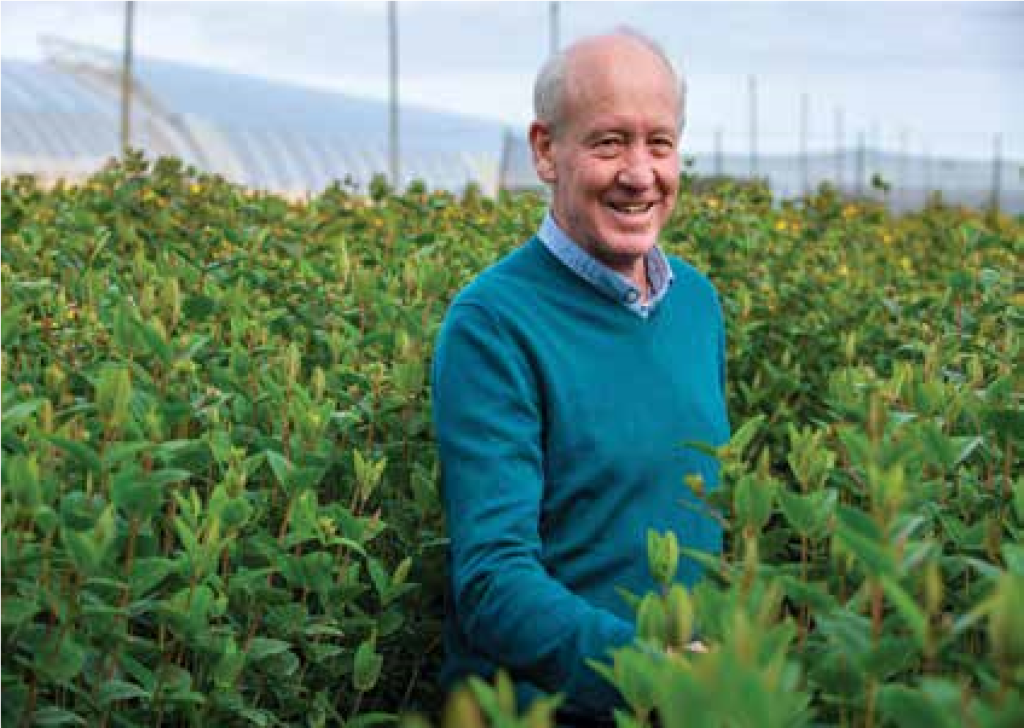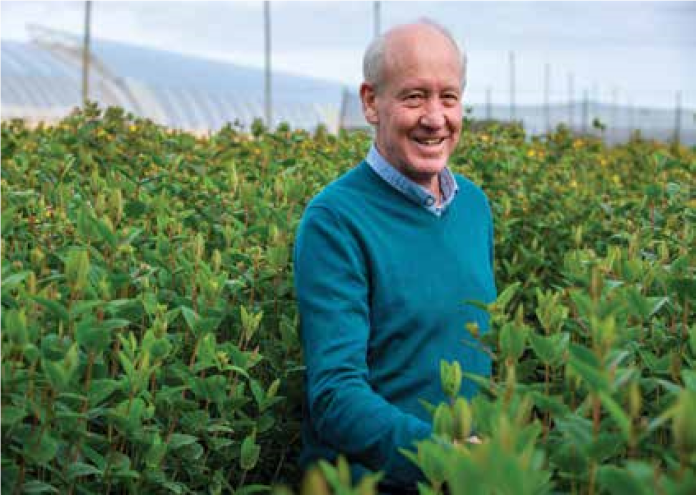Nanyuki, a popular investment and vacationing town along the Nairobi Karatina-Isiolo road is largely known for its wildlife conservancies and army garrisons. It is a quaint town that on clear days, affords one a scenic view of Mt Kenya. But outside the town, beyond the rustic and rugged beauty that defines the landscape, are flower farming enterprises.
Many flower growers, perhaps, due to the apparent ‘congestion’ in the traditional Kenyan flower capital of Naivasha, have been opting to invest elsewhere across the country. And Nanyuki, with its equally ideal climatic conditions, has often presented quite an irresistible option for these flower farming investors.
Born and raised in Nyeri, Richard ‘Kiki’ Fernandes, the immediate former chairman of the Kenya Flower Council (KFC) is one such investor, who was charmed by the potential of the town. In 2001, Kiki acquired a piece of land in Nanyuki’s Kangaita area and established the Kariki Nanyuki Farm. Previously known as Bondet, this is a flower enterprise largely focused on growing summer flowers.
Why summer flowers? one may ask. after all, for many years, roses have been all the rage in Kenya.
For Kiki, however, summer flowers presented a much more ideal option. They have always been marketable in the markets. European countries do not possess the ideal all-year-round climate for continuous flower cultivation. Therefore, for some time in the year, they are unable to produce these flowers, many of which are grown in open fields.
Kiki was introduced to Marginpar , a Dutch flower company that had been established in 1988. Kiki became a partner grower for Marginpar and by 2007 had expanded the Kariki Group to four locations in Kenya. Later Kiki then-expanded Kariki Group (after acquiring Carzan Flowers Kenya Ltd) and together with Rob Koning they merged and formed the Marginpar Group.
Today, 35 years later, the conglomerate is one of the leading summer flower growers with 17 flower farms spread across Kenya, Ethiopia, Tanzania, and Zimbabwe, and with sales and marketing operations in the Netherlands. In Kenya, Marginpar Group has seven farms, in Ethiopia three and in Tanzania and Zimbabwe it works with seven partner farms.
The different farms grow over 100 different varieties of summer flowers, on these 17 farms that cover a total of 460 hectares of production land and employ 5,000 people across Africa. Each of the countries has its own testing field
locations for the specific flowers that they grow.
From lisianthus airy Clematis to long stems of Delphinium, the bluest of Eryngiums, and big headed Scabiosa, fillers like Solidago, Limonium, Astrantia, Hypericum and Aster, and special niche flowers like Polianthes, Jatropha and Gloriosa, among so many more, Marginpar Group has all these flowers grown on its different farms across the region.
At least 80% of the group’s flowers which are, by and large, sustainably grown and produced, are sold through the Dutch flower auction where 800,000 flowers are processed every day at the Group’s distribution center. What’s more, Marginpar is a market leader in the supply of Clematis, Solidago, Astrantia, and Eryngium, and supplies 99.9% of all cut Clematis in the European Union market segment.
Over the years, Marginpar Group’s success in its flower business has, according to Kiki, been attributed to varied factors, including the fact that its farms are situated in rich and floricultural favorable regions. Even so, the concept of Kaizen has, perhaps, played the most key role in helping achieve this feat.
Kaizen is a Japanese concept that facilitates constant improvement or betterment through principles such as self-discipline, common logic, and order. It involves all employees; from the highest to lowest ranks initiating changes – however small they are – which when put together have a significant impact on the organization’s overall growth. It focuses on creating continuous improvement based on the idea that small, ongoing positive changes can reap significant improvements, and is typically based on cooperation and commitment and attitudes. is in contrast to approaches that use radical or top-down changes to achieve transformation.
At Marginpar Group’s farms, the deployment of Kaizen has thus far proved to be a success story. On its Kenyan farms, for instance, the Group has a personalized Kaizen version. Hamuka (an acronym for Hatutaki Muda Kariki) is a slogan for minimalizing (or entirely eradicating) the wastage of resources. Muda is Japanese for waste.
Hamuka works based on the principles of serving and It empowering each other, unifying each other into effective teams, showing respect, friendliness, and solidarity, caring for the wellbeing of the people, and creating a better and healthier working and living environment. These principles are key to Marginpar’s being.
Hamuka, according to Kiki, is enshrined in the broader Kaizen concept. While the employees – who are called value adders at Marginpar – based on Kaizen organize themselves at work into natural teams who are responsible for ensuring that the process flow is implemented correctly., ,
“Kaizen (Hamuka) is all about culture and organization. And here, trust is an important component,” Kiki says. “With Kaizen, we move away from the ‘top-down’ model where management and individuals in high positions push to get things done while the employees below them have no idea what’s really happening and why.” He adds: “People come here to work and do a good job. Whenever something wrong happens, you need to ask yourself why it is going wrong.

CEO Richard Kiki Fernandes.

